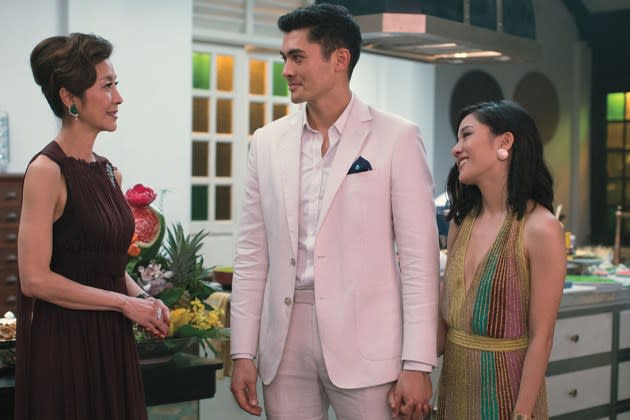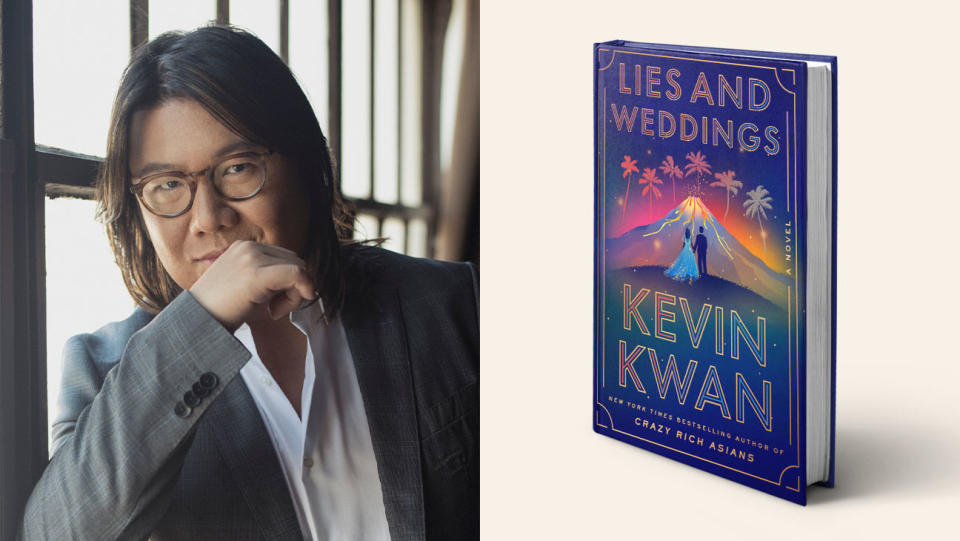Kevin Kwan on the “Special Alchemy” of ‘Crazy Rich Asians’ and What to Expect From His Next Novel

The summer of 2023 marks the 10-year anniversary of Kevin Kwan’s internationally best-selling debut novel Crazy Rich Asians and the five-year anniversary of its record-grossing big-screen adaptation, but the author barely had time to think about the dual milestones. For the past two years he has been engrossed in the writing of his fifth novel, an endeavor that he describes as “all-consuming.” But now that the literary cat is out of the bag — Kwan broke the news that Lies and Weddings, the continuation of his latest trilogy, will hit bookshelves on May 21, 2024 — he’s finding the time and the mental clarity to soak in what 10 years of Crazy Rich Asians has meant. Here, Kwan called THR (the morning after Tropical Storm Hilary hit L.A.) to look back — and forward.
Let’s talk about Lies and Weddings first. What can you tell us about how the idea for this novel came about?
More from The Hollywood Reporter
'Heartstopper,' 'Pride & Prejudice,' Among Big Winners at Inaugural TikTok Book Awards
Simon & Schuster Release Taylor Swift Fan Journal to Help Ease Swifties' Eras Tour Withdrawal

It’s funny, when I wrote the Crazy Rich Asians trilogy I had conceived of all three books before I even wrote the first one. After I finished with those books, my next (Sex and Vanity) was almost a counterpoint. I wanted to do something tonally different, a relief from this big, heavy family story. This new book continues with Sex and Vanity’s theme of Asian characters outside of Asia. When I was thinking about what the whole trilogy would be, for lack of a better metaphor, I thought of a Chanel bottle: New York, London, Paris. This time they’re in England. I’m taking that traditional English country manor novel, sort of a Jane Austen world, and turning it on its head. We have a duke married to a Hong Kong supermodel, and their biracial son has to find a rich woman to marry in order to save the family. I’ve been going to England my whole life and have often intersected with the world of aristocracy — I’ve visited the houses and seen the intricacies of what happens when you aren’t from a posh English gentry family but you marry in. It’s like Rachel Chu, another iteration of her discovering the world of aristocratic Singapore.
The book will be coming out during an interesting time, when people are questioning the need for British aristocracy, or seeing the way someone like Meghan Markle was treated. Do you think it’s necessary for a book about a similar topic to be in conversation with these timely issues?
It’s interesting that you bring that up because I’ve never thought of it in that way. My books are always infused with identity and cultural issues — that was always there. The fact that it’s happening now is kind of fortuitous because these conversations are necessary. I’m also here to entertain. This is a funny family comedy — it’s romantic; it’s satire. Hopefully, you laugh at what’s happening in the books but can also see how some of the behavior is brutal. There’s a lot to unpack. I guess things are in the air, right? I started writing this book over two years ago, so everything with Meghan and Harry and the queen that was happening while I was writing was also propelling me forward.
Do you feel like, even 10 years later, the success of Crazy Rich Asians is something that everything you do is being measured against? Or was it more of a buoy, giving your future work a lift without extreme pressure to follow it?
I was in the publishing business for 15 years before I wrote my first novel, so I know well that everything is a crapshoot. You can write the best book in the world, it can win every major award, and it can still sell five copies. There’s a special alchemy that has to happen. So from a pragmatic standpoint, I’ve never felt pressured to match that. Nothing ever will. It was a meteor hit. I’m grateful for it, and in awe of it, but I would drive myself literally crazy if I tried to top that. I try to see it as a gift, that offers creative license.
I remember reading in The Hollywood Reporter’s own reporting about the book’s adaptation that you had to make a last-minute decision whether to sell the rights to Netflix, for a big payday, or Warner Bros., which could offer a more traditional theatrical release. That anecdote feels almost metaphorical now, given the topics that are being debated during the Writers Guild of America and SAG-AFTRA contract negotiations.
I wish I could say I was psychic or a visionary, but when I chose theatrical over streaming I was making a very, very specific decision. I don’t want to knock Netflix in any way — because I think especially in the world of limited series they’ve made some of the key shows I’ve really loved over the last few years — but seven years ago, it was a very different landscape. The circumstance for our decision-making was that, this is the first time we have an all-Asian cast telling an Asian story in 25 years. The movie was a unicorn and we had to be able to prove its success. The only way to do that was an actual box office. To say, it was number one or number two. We also wanted to create a cultural moment where families could come together to the theater to watch. That was the vision and the hope, and it ended up coming true. So the decision was a purely emotional one.
Did you feel supported, or understood, in your desire to make the decision based on emotion? We’re in an industry where a lot of people think the smartest thing to do is to make a decision based on finances.
I think we were on a 27-person conference call. Nina Jacobson and my producers at Color Force really stood behind me 100 percent. [Director] Jon M. Chu was 100 percent supportive. We made that decision in tandem. But I think everyone else on that call was probably thinking I was the stupidest person on the planet. To them, I was walking away from a sure thing: guaranteed money on the table, guaranteed budget to make the movie you want. Instead, we rolled the dice.
Was there a particular moment in which you realized, in full, what a success the movie was turning out to be?
I’m getting very emotional thinking about this. The first weekend it opened we went to New York and did these surprise drop-ins at movie theaters as part of our publicity tour. I went to the AMC Union Square, which was my neighborhood theater at the time, and I was standing there as credits were rolling and they played the mid-credits scene where Astrid, played by Gemma Chan, flirts with Harry Shum as Charlie Wu. Only fans of my books would know who he is, because he hadn’t been introduced yet, but the minute he appeared this roar went up in the audience, of all these people being so excited. It was like being in a Marvel movie when they drop an Easter egg. That was so galvanizing.
It’s when you realized everyone was there because it was a movie made of your book, and not just a book?
For a long time Warner Bros. kept asking, “Will this cross over? We hope this movie will cross over!” I knew my readers and I knew my fan base, I knew there would be a lot of support from the readership. And I knew that my readership is not made solely of just Asian Americans.
When they were saying “cross over,” was that a euphemism for: Will this attract white people?
Exactly. I tour around the world, and I see who my readers are; I know they come in every color of the rainbow. We live in a country where the majority of the people are still white, so the majority of my audience is white. Even if every Asian American read my books, it wouldn’t hit the best-seller list without a white readership because we’re only 5 percent of the population here. Not to get on my soapbox, but I think the industry underestimates the moviegoing audience. We had a movie with two known actors, Michelle Yeoh and Ken Jeong. Everyone else was new. And now they’re superstars. Hollywood used to make stars, and we can make stars again.
How important is it to you, for the legacy of the first film, that the sequel comes to fruition?
I’ve learned to be very pragmatic. I truly understand now that so many things have to come into perfect alignment before anything gets made. I still would love to see the full trilogy made into films. We’re working toward that. Everything’s in development and there’s a lot of support. Warner Bros. certainly wants to make it happen. Even though we’re in a strike, there’s still intention and support. But so much has to happen, so I don’t really hold my breath. I just put forth my intention and try to help that intention as much as I can. But, at the same time, I’ve also moved on.
Moved on to this next literary trilogy, or moved on in Hollywood as well?
Sex and Vanity is also in development with Sony, so there are lots of exciting things happening around that. We were supposed to be filming this summer. I think our original shoot date was supposed to be Aug. 3. And over the pandemic, I co-wrote my first original screenplay that had nothing to do with my existing books. I keep throwing balls in the air and hopefully something lands.
Were you aiming to write a screenplay, or did the opportunity come to you?
I happened upon what I thought was a really fun idea, and the best way to tell it was a screenplay. It would have been a very short novel, a short story really.
A lot of people talk about what the legacy of Crazy Rich Asians has been; whether it’s building the careers of the actors or allowing more and more films by Asian filmmakers, with Asian casts, to be greenlit. What do you think of when you think about its legacy?
I think of the way that so many people were involved. I planted a seed, but it took all these people coming out and supporting it. It started with the readers who took a chance on an unknown author, and then spread the news of the book through word of mouth. I’m very humbled to have been the seed planter for this book that I never even expected to be published.
Interview edited for length and clarity.
Best of The Hollywood Reporter

 Yahoo News
Yahoo News 
